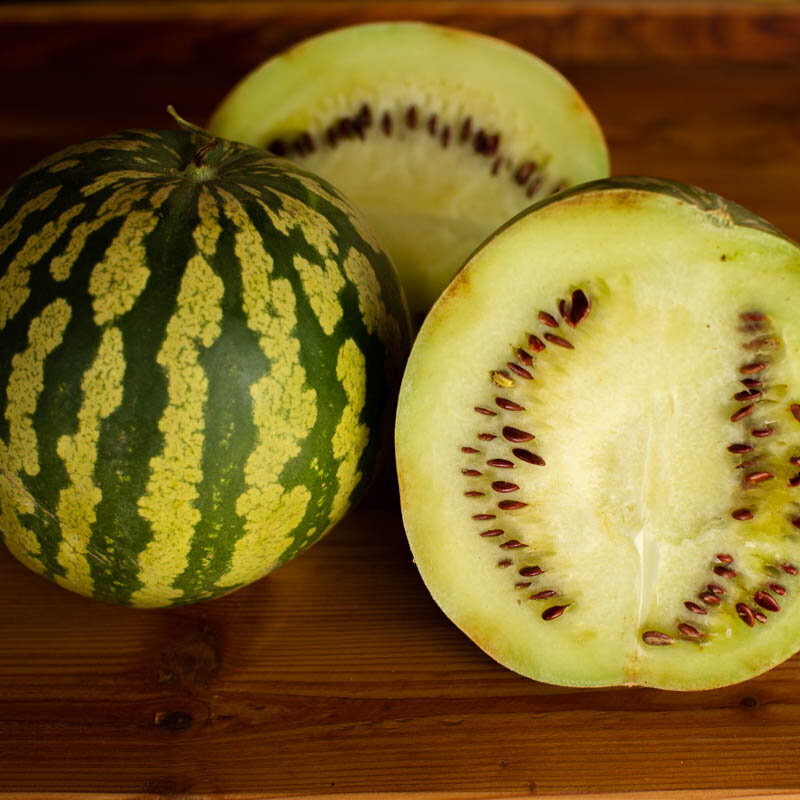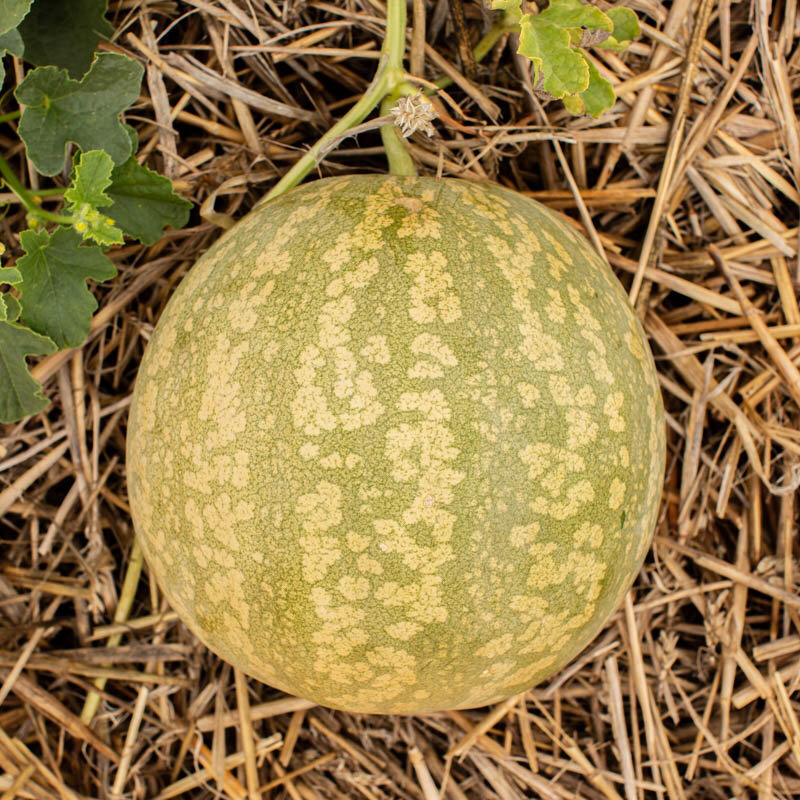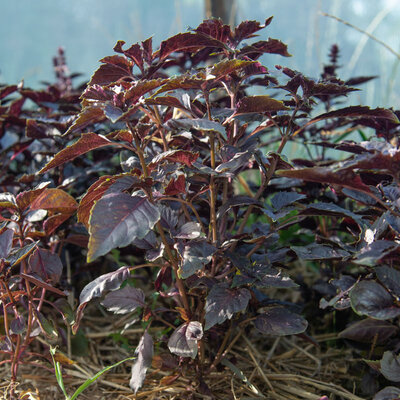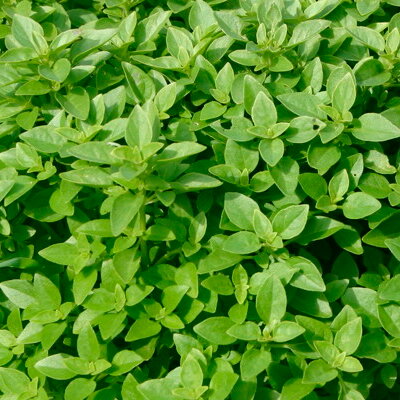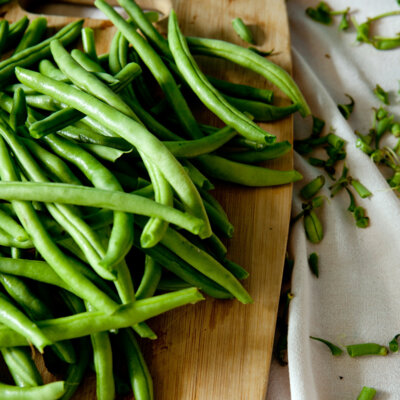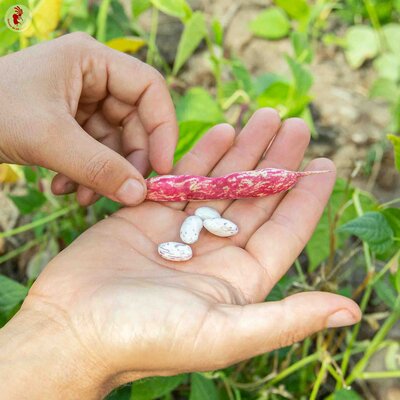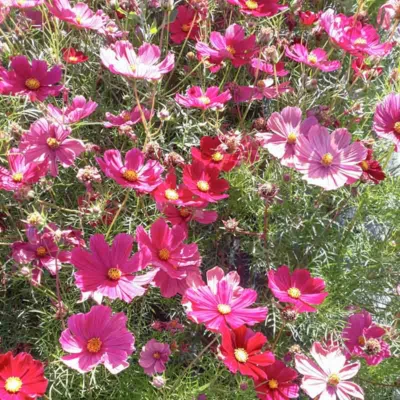Red Seeded Citron melon - Watermelon
Green watermelon with red seeds for jam is a very old variety of watermelon, traditionally used for jams.
Characteristics of green watermelon for jam with red seeds
Citrullus lanatus is a very old variety, traditionally used for jam, particularly in the Vendée region and southern France. Also known as "Gigérine" and "Citre à confire", this watermelon was introduced in Vilmorin-Andrieux's 1883 book Les Plantes Potagères. This mid-season variety produces spherical, light-green fruits with grayish green mottled stripes, 30 to 40 cm in diameter, with juicy, sweet, greenish-white flesh and pink or red seeds.
Sowing green watermelon with red seeds for candying
Green watermelon is sown in pots 6 to 8 weeks before transplanting, from March to April, in bunches of 2 to 3 seeds. Place seedlings under a bright, warm shelter, at a temperature above 21°C, and keep the substrate moist until the seeds emerge. Transplant into the vegetable garden once the last frosts have passed.
From April to May, after the last risk of frost, it is possible to sow directly in the garden in 2 to 3-seed stacks.
Prepare holes filled with compost or organic matter 2 weeks in advance, spaced 1.50 m apart in all directions, to accommodate the watermelon plants or seeds. Water freshly transplanted seedlings regularly, avoiding wetting the foliage, and mulch the soil to keep it cool and limit water evaporation.
To encourage height growth and free up space on the ground, install sturdy supports when transplanting the plants. In cooler regions, we recommend warming the soil with mulch before planting, and leaving only one to three fruits per plant to encourage ripening.
In the vegetable garden, watermelon enjoys the company of potatoes, leeks and onions.
Harvesting green watermelon with red seeds for preserving
Green watermelon with red seeds is harvested from July to October, when the fruit is heavy and the tendril opposite the stalk is dry. Be careful not to tear off the fruit, but to cut it as close as possible to the stem, 10 cm above the stalk. Watermelons do not ripen after picking. It can be stored for several days in a cool, dark place, or made into jam.
These products may also be of interest to you
in bucket, in the ground
Sow in pots at 20-30°C, 6 weeks before planting. Transplant with the root ball, after the last frosts, in planting holes enriched with compost, spaced 1.5 m apart in all directions. Sowing in the open ground is possible under the same conditions, once the soil has warmed up and outside temperatures have not dropped below 15°C.
March, April, May
April, May
July, August, September, October
in the ground, in the greenhouse
sunny
medium
sandy, humus
rich, reheated, drained
Citrullus lanatus
mid-season
From 1000 to 3000 g
15 seeds
oval
juicy
Red
From 100 to 200 cm
From 30 to 40 cm
runner
cut
1883
"Vilmorin-Andrieux "Les Plantes Potagères
This ancient variety of watermelon is traditionally used for jams. It is also called "citre à confire". It is widely used in the Vendée and southern France.
Watermelon contains almost 92% water and little fiber, making it easier to digest for people with sensitive intestines. Rich in lycopene, an antioxidant that gives it its red color, it has cholesterol-lowering, anti-inflammatory and cell-protecting properties. Its content of amino acids and vitamin C contributes to a healthy immune system. The seeds are also rich in vitamin C, proteins, carbohydrates and lipids.



